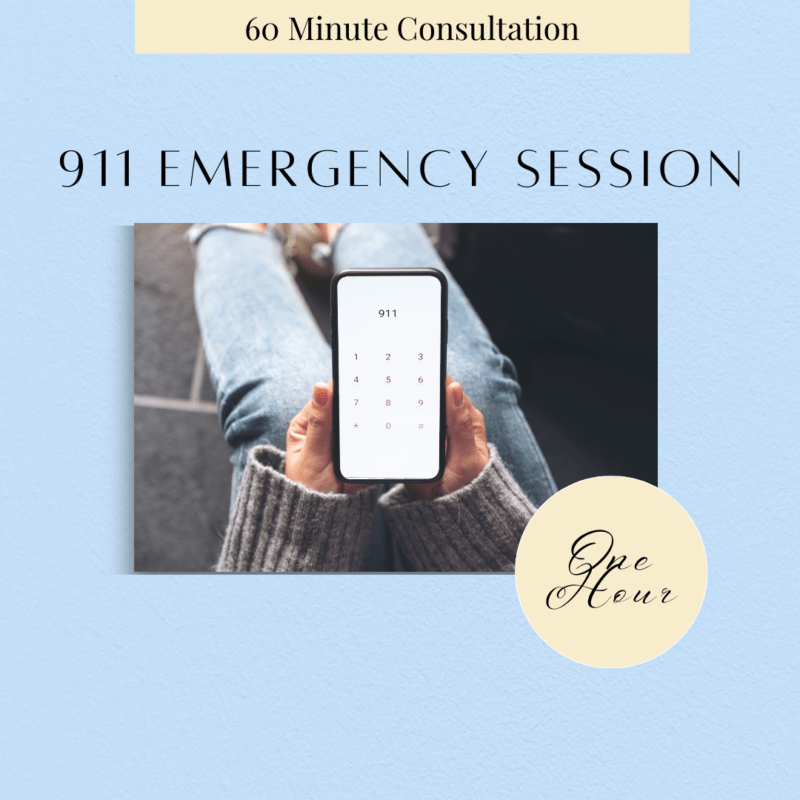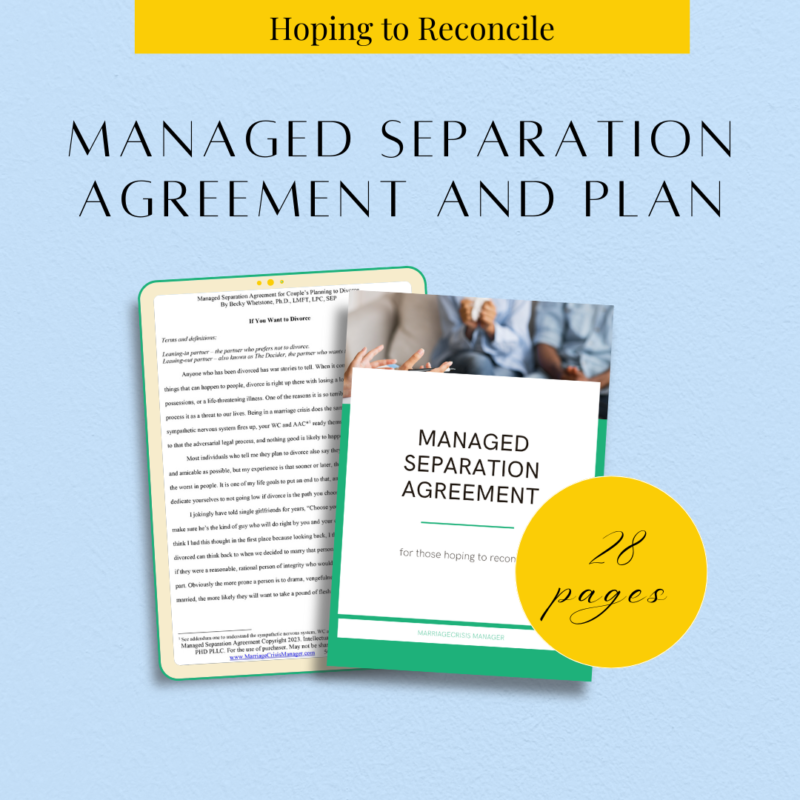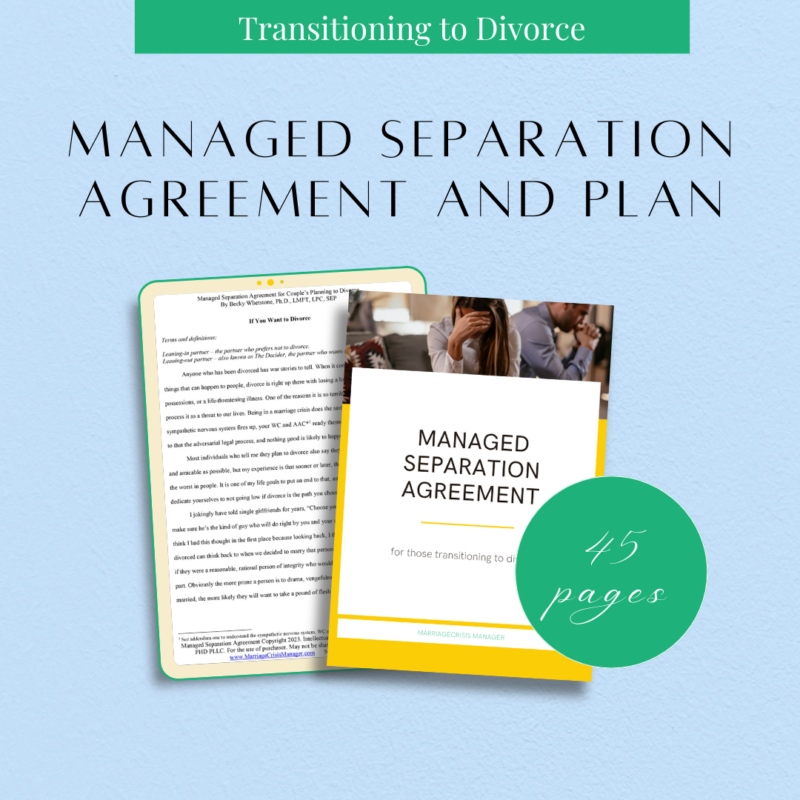Both parents should read the following book to get a sense of what it is in the best interest of the children while going through the process of separation:
“Helping Children Cope With Divorce.” By Edward Teyber.
(You can order it from Amazon directly from my website at: http://www.doctorbecky.com/recommendedreading.html)
1. When you talk to your children about the separation, it is important to do it together. Stress that is it not their fault, and the decision has nothing to do with them, but to do with your marriage and the relationship between the two of you. Absolutely DO NOT say things like, “Mom wants to separate,” or “We are going to separate but I don’t want it.” That sort of talk is meant to punish mom and drive a wedge between she and the children. Instead tell them something such as, “Mom and I have been having problems so we’re going to separate to see if we can work things out.” Reassure them that you are taking your marriage to the doctor, and are doing what you can to make the best decision for your family. Reassure them that no matter what happens, they will have access to you always, and that although they will not see you every day, you will still be hands-on and involved completely in their lives.
2. While it is important to be honest with your children about what is going on, it is also important to leave out dirty details, negative comments, or blame. Separations and unhappy marriages are a part of life, and it is important that children not be shielded completely from life’s realities. However, as a family therapist who mops up divorce messes all the time, I can assure you that each time you talk negatively about your children’s parent, you are damaging your children, and the respect and admiration they have for YOU, so DO NOT DO IT. Your children need the space to feel loyal to both of you. When you provide them negative evidence against the parent they love, you confuse this process, and it is a crime against your child’s self esteem and sense of safety in the world. So, do not speak about your spouse positively, negatively, or in any other way, except having to do with logistics – example: “Mom is caught in traffic and will be 10 minutes late to pick you up today.” Period. DO NOT SAY THINGS LIKE: “You know how mom is always late, so of course she’s late again today, what do you expect? She cares about no one but herself.”
Got it?
Can I talk to my kids when I’m not with them?
Yes, you can. As far as the separation goes, DO allow the children to receive phone calls and make contact with mom or dad by phone if it brings them comfort. You may just let them know that while you will make every attempt for them to talk every day, they may sometimes miss a day, and that’s OK, and doesn’t mean anything is wrong or they are not thought about or missed. To avoid contact with your spouse, many couples add an additional kid’s cell phone so that the child may have direct contact with the parent they are away from. When it comes to phone contact, when you first sit them down and talk about the separation, also let your children know that once or twice a day phone calls is reasonable, but calling all day and night is not. Tell your child to leave one message for mom or dad, and he or she will call back when able. Same goes for mom and dad – leave one message; refrain from calling over and over. When in the trenches of the separation, help children find a balance when it comes to this.
- Do not put your kids in the middle.
Many of my clients have heard the term, “Don’t let your kids become pawns in the divorce or separation process.” What does that mean? I’ve created a list of examples so you can get a clear idea about it …
PAWN DO NOTS …
• DO NOT allow your child to be an informant. Do not ask you child about mom or dad. Nothing. Nada. Not how mom or dad is doing, who they are hanging out with, not if he or she’s happy or sad, not how much beer he or she’s drinking, not how much he or she’s sleeping, or anything else.
• Do not use your child as a go between of information. Examples: Don’t tell your child to tell your partner you love or miss her or him; don’t tell your child to tell your partner you need more money, don’t use your child as a messenger AT ALL!
• Do not manipulate your child to be on your side. Let children figure out who is to blame on their own – and believe me, they will. If you try to influence or sway the vote, it’ll always backfire, and often ends in resentment and many years of estrangement from YOU. Don’t do it.
Other DO NOTS …
• Do not allow your kids to parent or take care of you.
• Do not allow your kids to feel responsible for your happiness. Encourage them to continue with their lives, activities, friendships, even when it’s your time to have with them.
• Do not buy their love, or buy them things because you feel guilty. Disneyland parenting filled with numerous activities is not advised … just live a normal balanced family life – sometimes with activities, sometimes not. It is not good for kids to be entertained 24/7 – and you should not allow yourself to take on the role of the tour or entertainment director. It’s OK for kids to get bored occasionally and learn how to entertain themselves.
• As little change for kids as possible is advised at this time. So, if at all possible, do not move the child or children more than 30 minutes away from the other parent during the Managed Separation process, and keep them in the same schools and activities as much as possible.
DO …
• Always be pleasant, friendly, and respectful with your partner when making the kid exchange. Believe me, your kids will be watching this like a hawk – make them proud.
• It’s OK to be human in front of your children, which means sometimes for brief times being sad, happy, lonely, or bored. BUT, (here’s a do not …) do not wallow in the depths of despair and sadness for many hours or days in front of your children.
• Attend school and sporting events that your child is involved in, even when it is not your day or week to have the kids, but don’t sit with your partner when you do unless invited.
• In couples sessions, DO bring up what your child is VOLUNTARILY telling you about mom and dad’s parenting skills while you’re away. What kids say should be taken with a grain of salt, as many times the child is actually trying to manipulate you in some way when doing this. If the problem becomes a continuing one, we may end up having to do a family session over it, but the idea is not to allow your child to create “splitting” or alliances with mom or dad that leave the other parent in the cold. Parents should be united against splitting.



